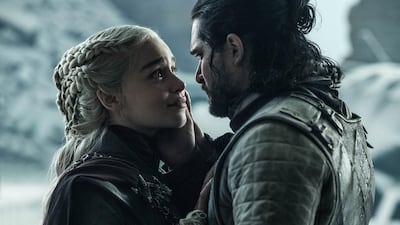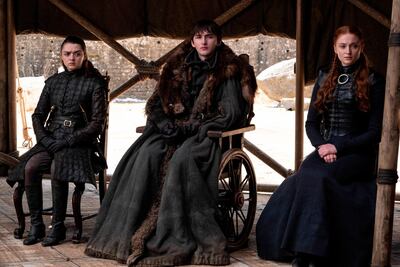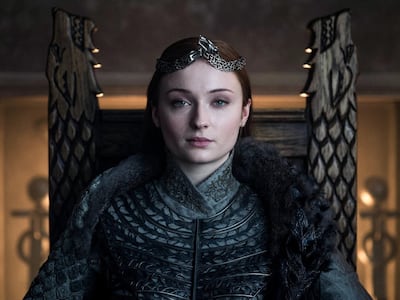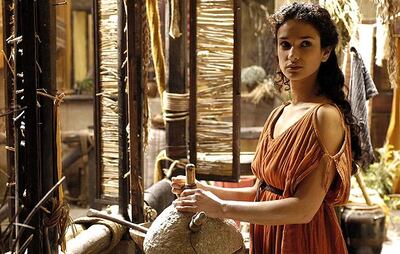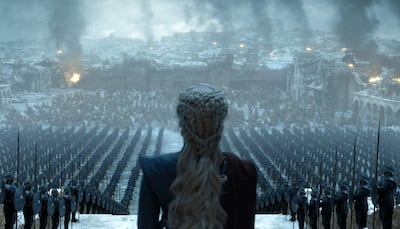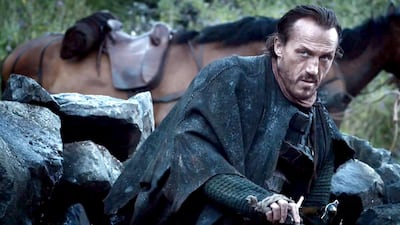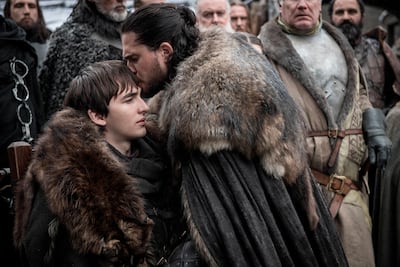Wrapping up a novel series is no easy feat, especially when the books haven't been finished yet.
It took George R R Martin five years to write the first book in the A Song of Fire of Ice collection (which was called A Game of Thrones), and so finishing off the convoluted stories in 23 TV episodes without direction from the novels was always going to be tricky for the HBO team.
But, it was also their choice to do so.
Game of Thrones is excellent viewing. It is one of the TV phenomena of our time, and has successfully surprised its viewers at every turn. And while the last season was generally good TV, it's fair to say that since the show's creators D B Weiss and David Benioff took the storytelling reins, the pacing and character development has felt 'off'.
It was always going to be hard to make viewers happy when ending this show, but it felt like they were following feedback from testing groups and what they thought people wanted to see, rather than respecting the story's many different narratives.
Game of Thrones involves dragons and necklaces that can turn back time, sure, but the beauty of the first five seasons, and even the sixth, was that the pace was slow, and we got to sit with the characters as they stewed over decisions. Thus, their motivations and therefore actions were always believable.
That was certainly not the case in season eight: there were too many 'deus ex machinas' used to fill in plot holes, and too many questions left ignored.
Warning, spoilers lay ahead...
1. Why would rulers happily hand everything to the Starks?
Halfway through the final episode, we fast forward a few months: Jon and Tyrion's scraggly beards make that clear. Tyrion and Jon are prisoners for, respectively, betraying and killing Queen Daenerys.
Tyrion is put in front of people that "represent all the Great Houses" of Westeros. These include House Stark, House Arryn, House Lannister, House Greyjoy, House Baratheon, the Maesters and House Tully. Some other fan favourites, like Ser Brienne of Tarth and Ser Davos Seaworth are also there – why? We're not sure, and are clearly not meant to overthink it.
The gathering has to decide what to do with Jon and Tyrion, and also pick a new ruler for the seven kingdoms. No easy task: the latter has basically been what the show's entire conflict has been about.
Grey Worm appears to have a lot more power than expected, and prisoner Tyrion pipes up and gives us heartfelt words about storytelling (meta?) and then suggests Bran Stark, aka the Three Eyed Raven, should be the king.
The rulers slowly say 'aye' to this decision (and nothing else), and then Sansa says she refuses to accept her brother, and insists the North remains independent. Bran's reaction? A brotherly shrug, it seems he's cool with it. Everyone else's reaction? Nothing, they also appear fine with it.
Bran's reaction to absolutely everything is a glazed-over daze, so his response is kind of believable, but there's absolutely no way the Dorne and Greyjoy representatives would just sit back and let two Starks take over absolutely everything.
They may be our fan favourites, and so we want them to rule it all, but it's not believable that the other rulers would sit passively and let that happen. (Older men love deferring to 20-something women in the boardroom.)
Yara Greyjoy bargained hard with Dany for independence for the Iron Islands, and Dorne is a region that is known to have fought for independence for centuries. All that we have learned about these two regions and people make that moment in the finale close to impossible.
2. Where is Ellaria Sand of Dorne?
She was held prisoner at King's Landing last we saw, so sure, she probably didn't make it through Drogons's destruction, but it feels like she was one of the many characters that were just put in the 'too hard to wrap up' basket.
She was cool, she deserved more.
The characters, then and now:
3. Can Jon speak Valyrian and Dothraki now?
As Tyrion tries to convince Jon to pop off Dany, he emotively reminds him of what the newly mad Queen had just said to her soldiers, both the Dothraki and the Unsullied.
Surely Tyrion and Jon's command of both the Valyrian and Dothraki languages isn't strong enough to gather inflection, intention and emotion from them? Or even, to understand what she was saying? Another head-scratcher.
4. Where was Arya's white horse?
We saw Arya get on a white horse at the end of the penultimate episode and ride out of King's Landing. It was a beautiful moment. But then, at the start of the final episode, she's still in the rubble she seemingly rode away from, sans horse.
Sure, she could have rode the horse halfway and got off, etc, but this moment feels emblematic of the final season's need to show us beautiful moments that look good, rather than follow logic or tell us something about the state of play.
Was the horse there purely just to fulfill a cinematographer's desire?
5. One dragon is easy to kill, the other impossible?
The fact that Euron Greyjoy's army killed a dragon with two shots from a scorpion bow when the Night King's army only managed to kill one dragon after two attacks was one of the less believable moments in the season.
We also didn't get to see how the shots were achieved, or any part of the Golden Company's strategy. Two perfect shots in episode four (the one through the neck seems to come from an impossible angle), but then in episode five, Drogon the dragon zooms right toward multiple ships, and Euron Greyjoy basically just stands there. They don't land a single arrow on the mythical beast.
6. Grey Worm is Westeros's Usain Bolt?
When Jon sees Grey Worm ordering the beheading of the Unsullied, he stomps off to immediately talk to Dany about it, leaving Grey Worm to do some beheading.
But then, magically, Grey Worm stands by Khaleesi's side as Jon approaches her, having summoned his entire army. Did Jon have a tea break?
7. Why isn't Gendry worried?
Gendry is a Baratheon, sure, but he was made the Lord of Storm's End by Dany, who dies quickly after the fact. He looks mighty assured in his power in the final episode's scene. That is unlikely. We're sure the other Baratheons would have something to say about this unknown man strolling up to take over.
'Hey guys, the lady with the plaits said I was boss, end of.'
8. And what about the Dothraki?
In the Battle of Winterfell, we were led to believe that the Dothraki were all but decimated by the White Walkers. But then, they appeared en masse in the final episodes: a magical elastic army.
That said, anything could have happened in the Battle of Winterfell: we honestly couldn't see anything that went on in the episode so perhaps many more of them survived than we thought. Seriously, it was a battle we'd be waiting years for, and yet the whole thing was pixellated and indecipherable, even though we invested a lot in our HD TV, watched the show on an HD service, turned off all of our lights and hiked up our TV's brightness.
We'd consider that a fail.
But, more importantly, the Dothraki were done a disservice in terms of character motivation: at the end of the episode, it was clear that Grey Worm and the Unsullied had actual feelings and wanted vengeance, but her original 'team', the Dothraki, who showed loyalty to her for seasons (even after she killed their Khals), were seen just ambling onto a boat at the end, not fussed about the fact their Queen was killed.
It's safe to say this is a group of people who wouldn't have let their Queen go down without then starting a fight.
9. Why is Bronn the Master of Coin?
Giving Bronn the role of Master of Coin (a man who Tyrion had to explain basic arithmetic to in seasons past) was baffling.
It felt very much like the creators had gone, 'everyone likes this character, he's got good chat, and gets great audience feedback, let's make him important at the end'.
10. Bran, what about Bran?
We know he's the Three Eyed Raven. But we still, to be entirely honest, don't know what that means. Can he change the future, or can he just passively see it? That's not explained.
When he told Jon he was actually a Targaryen, was he doing so to create division, turn Dany evil and make space for himself? Is he actually the most evil of them all? Did he plot all along to take power?
If this was the case, it'd be an interesting turn, and a great plot line, but it needed to have been explained better: basically, as with all of the above issues, we needed to understand his motivation more.
Also, having his last scene see him appearing at a meeting, doing very little, and then saying he was going to go off and find the dragon with his mind's eye felt hackneyed.
Plus, he's the god of a religion that many in Westeros see as heretical. So, we think they'd just happily let him take over? So. Many. Holes.
11. Speaking of, why don't people care about the magical powers more?
Everyone's obsessed with the mother of dragons, but we just saw The Red Lady creating fire in the middle of a battle. And Arya can change faces.
No one cares.
These moments were treated as plot devices to carry the story along, rather than big moments that needed to be dealt with and played out. Surely, if people had witnessed these events, they would then be awe-inspired by these women?
They would be the talk of the town if you will, and everyone would turn to their religions. But no, again, no one's fussed, and they never mention them again.
Why? Well because maybe it's easier that way, all the viewers care about is Jon Snow and Khaleesi, right? And maybe a bit of Arya and Sansa?
Wrong: the mysterious side plots and interwoven tales made the show what it was, and they felt under-served by the final season.
Ah well, we guess we've still got the prequel TV show, and – hopefully – the books.
